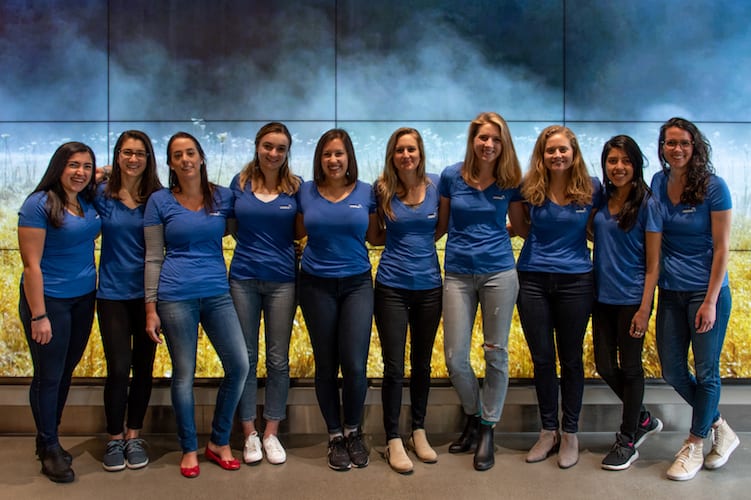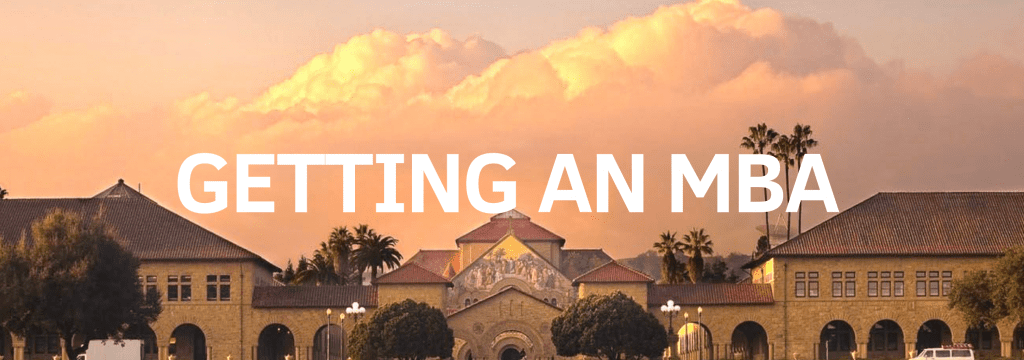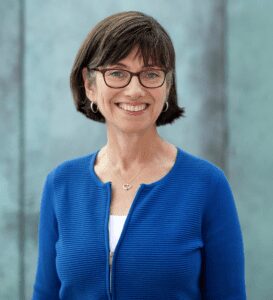Join the MetroMBA community by registering and receive resources such as admissions deadlines, scholarship information and how to finance your MBA.
Search results for :
Top MBA Recruiters: Merck
Global health care is one of the fastest growing sectors in 2019, with Deloitte expecting spending to reach $10.059 trillion by 2022. Thanks to aging and growing populations, you can expect a greater prevalence of chronic diseases, ultimately translating to exponential advances in innovative technologies, medicines, and care.
For MBA graduates, this translates into a huge potential for job opportunities in the health care sector. In particular, there are opportunities for:
- New innovative technologies and personalized programs to engage with consumers.
- Better data security and ownership.
- Increased health care delivery and mobility.
One of the companies at the leading edge of this sector is Merck. Continue reading…
Friday News Roundup – Wharton Opens FinTech Center, Northeastern Students Give Back, and More
Let’s take a look at some of the biggest stories from this week, including the all new Wharton FinTech Center.
Giving Day at D’Amore-McKim – Northeastern University News
On April 11, 2019, Northeastern University will host its Annual Giving Day: a 24 hour event that will support, among other NU endeavors, expansion of D’Amore-McKim‘s programs.
“Giving Day is a great way of getting our entire D’Amore-McKim community to come together to support what makes us remarkable,” Deborah Magnezy, Assistant Dean of Development at D’Amore-McKim, says of the event.
Among the funds to which donors can contribute are a FinTech Initiative, which engages students with the latest in technological advances within the financial services community; the Entrepreneurship and Innovation Fund, which will help create co-ops for students in this field; a Global Learning Fund, and the Digital, Analytics, Technology, and Automation (DATA) Initiative Fund.
Giving Day will feature speakers and activities for alumni, students, faculty and all others who support the school. To learn more about Giving Day, click here.
Wharton Announces Stevens Center for Innovation in Finance – Wharton News
University of Pennsylvania’s Wharton School of Business announced the establishment of the Stevens Center for Innovation in Finance in order to focus on tech innovation across the industry.
Named for Ross Stevens, alum and founder of Stone Ridge Holdings Group, the center will hold its inaugural event on April 3. FinTech leaders such as Wharton alum Jackie Reses, head of Square Capital, and David Klein, CEO of CommonBond, will appear at the event. The Stevens Center will be led by David Musto, Ronald O. Perelman Professor in Finance at Wharton.
According to Penn president Amy Gutmann, “The mission of the Stevens Center is precisely this: to ensure that innovations in finance make the greatest positive contributions to businesses and communities across the globe. The Stevens Center will catalyze Penn’s world-leading research and industry engagement and enrich the opportunities available for our outstanding students.”
The center will welcome business leaders to campus, and will offer students curriculum in FinTech research. It will also offer engagement with Wharton’s various FinTech clubs to open new career pathways for interested students. Along with courses, the center will offer mentorship opportunities and research projects, which will translate into real world applications.
You can learn more about the new Wharton FinTech Stevens Center here.
Gies Students Honored for Southside Startup – Gies College of Business News
Jordan Buckner and Isaac Lozano, two University of Illinois Gies College of Business MBAs, have brought their b-school knowledge to bear in the formation of their Chicago company Tea Squares, and have also created great social impact within the South Side community.
Tea Squares, which are snacks infused with energy enhancing teas, are selling in hundreds of retail stores, including Whole Foods, Jewel, and Mariano’s. In addition, the company’s success has earned the partners acknowledgement by Forbes for its annual 30 Under 30 list. Buckner says of the Forbes mention, “It was awesome to be recognized for creating a great-tasting snack to help people achieve success during their day and also be recognized for our social mission, which is a critical piece [of our business plan]… it was very humbling to be honored in that way.”

TeaSquares founders and Gies alumni Jordan Buckner, left, and Isaac Lozano, seen in their recent Chicago Tribune feature.
Tea Squares offers fellowships via partnerships with community revitalization groups. Through this, Buckner and Lozano find candidates with high-potential for sales, marketing, or production roles. The end goal of the fellowship is to train candidates to pursue their own ventures, thus strengthening the economy of the South Side.
For more on Buckner, Lozano, and Tea Squares, click here.
Stern Announces Major Research on Sustainable Products Market – NYU Stern School of Business News
The Center for Sustainable Business at NYU’s Stern School of Business recently released new findings from its Sustainable Share Index, an analysis of consumer’s purchases of products and business marketed as sustainable.
Over half of the growth in sales of consumer packaged goods since 2013 has been comprised of products with ‘environmentally friendly’ attributes. These items comprised 16.6 percent of consumer sales in 2018. Over the five year period, sustainability-marketed products had an increase in sales of 29 percent, or $114 billion. This may grow to $140 billion by 2024.
NYU Stern professor and founding director of Stern’s Center for Sustainable Business Tensie Whalen says:
“Results from this research reinforce the idea that embracing sustainability leads to better business results. We are excited to launch the Sustainable Share Index and look forward to continuing our research in the years to come.”
Other experts on sustainable business were quick to remark on this “eye opening” study. “Companies should take notice—the benefits of sustainability cannot be ignored … In fact, this groundbreaking research shows the significant impact that sustainable products have on overall category growth.” notes Randi Kronthal-Sacco, senior scholar in Marketing and Corporate Outreach from the Stern’s Sustainable Business Center.
For more on the Sustainable Share Index and the recent research, click here.
Berkeley Haas Hosts 23rd Annual Women in Leadership Conference – Berkeley Haas News
The University of California’s Berkeley Haas School of Business‘ Women in Leadership Conference takes place this weekend, March 16, 2019.
A team comprised of Berkeley Haas MBAs has worked for months to produce the 23rd annual event, which is the school’s longest running conference. With over 300 attendees expected to attend and 20 speakers on various issues affecting women across the world, WIL’s 2019 theme will be “Your Stories, Your Growth”.
Dean Ann Harrison will open the event with a welcome address. A keynote speech, panel discussions, and breakout sessions are to follow. Erin Casale, MBA 19 and WIL conference team member says of this year’s theme, “Stories inspire change, and that’s our ultimate collective goal … We recognize that everyone attending this conference brings something to the table.”

Members of the 2019 Women in Leadership Conference at the UC Berkeley Haas School of Business / Photo via http://newsroom.haas.berkeley.edu
Other speakers will be Sandra Lopez, VP at Intel Sports; Tyi McRay, interim director of diversity at Airbnb; Elena Gomez, CFO of Zendesk, and Brandi Pearce, lecturer in the Management of Organizations at Berkeley Haas.
Casale notes that the goal for the conference is to plant the seeds for change for those who attend.
“For us, it will be a win if attendees come away with a clear next step of what they can do to set themselves and their peers on a better path toward equity and inclusion … We want people to feel equipped for change and inspired to start it.”
Click here for more on this year’s conference.
How to Get an MBA

Are you thinking about pursuing an MBA or in the process of applying to graduate business schools? If so, MetroMBA has your back. As a prospective applicant thinking about getting an MBA, the process can seem daunting and overwhelming. However, we have provided key information on what you need to know about getting an MBA, the factors to consider, what types of MBA programs are offered and the general requirements for applying to business school. Below you will find the Ultimate Guide to Getting and MBA courtesy of our experts at MetroMBA:
What is an MBA?
A Master of Business Administration (MBA) is a graduate degree earned at a higher education institution that provides theoretical and practical training to help graduates gain a better understanding of general business management functions. According to our MetroMBA Database of over 150 schools, the core courses in an MBA program cover various areas of business such as accounting, applied statistics, business communication, business ethics, business law, finance, managerial economics, management, entrepreneurship, marketing, and operations in a manner most relevant to management analysis and strategy.
Is Getting an MBA Worth It?
You may be asking yourself, why should I get an MBA? You may be factoring in your current professional career trajectory and thinking whether that promotion will be yours without an MBA. You may also be thinking about ways to increase your salary in your current professional industry. Or you may be looking for a career change and believe that an MBA will open new opportunities for career advancement. All of these are great reasons to get an MBA and potential outcomes that getting an MBA will provide to you.
Program Formats:
This chart breaks down the four most common MBA program formats and includes a format description, typical age of students within each program, the typical length, average cost, who we recommend to take each program and the flexibility rating for completing the program.
| Category | Program Format | Typical Age Range of Student | Typical Length | Average Cost | Recommended For: | Flexibility Rating |
|---|---|---|---|---|---|---|
| Description | Describes how each MBA program is delivered to students. | The range varies significantly depending on the prestige of the institution. | The ability to balance work/life and your academic degree. The more check marks, the more flexible the program. |
|||
| Full-Time | Typicaly delivered on-site with live classroom sessions. These classes are held throughout the day and night depending on course schedule. | 25-34 | 12-24 months | $40,000-$150,000+ | - Young professionals who are looking for new career opportunities and/or career changers - Working professionals who can commit to a full-time academic workload and can be temporarily unemployed as they pursue their MBA | ✔ |
| Part-Time | Typically delivered on evenings or weekends in a hybrid format, which allows students to take classes both online and on-site. | 21-55+ | 24-48+ months | $40,000-$150,000+ | - Working professionals who cannot leave a full-time job commitment - Individuals with families or personal commitments | ✔✔✔✔ |
| Online | Most online MBA programs offer all learning fully online, however some programs require students to meet on-campus or at a remote location once throughout your degree. | 21-55+ | 16-48+ months | $10,000-$130,000+ | - Those seeking a flexible MBA to maximize work/life balance - Students who can excel in online learning environment | ✔✔✔✔✔ |
| Executive | Typically have on site sessions on the weekend once per month with other virtual requirements during the week. | 34-45 | 20-36 months | $45,000-$200,000+ | - Middle Management seeking career advancement - Career switchers - Working Professionals who are looking to refine their skills, knowledge and expertise | ✔✔✔ |
What are the Different Types of MBA programs?
Full-Time MBA:
Typically delivered on-site with live classroom sessions. These classes are held throughout the day and night depending on course schedule. The average age of a full-time MBA student is 25-34 and usually take between 12 months to 24 months to complete the program. One-year MBA programs are on the rise among universities due to the demand of MBA students seeking to complete their degree faster than the typical two-year MBA program, and are commonly found outside of the U.S. The average cost of a full-time MBA varies depending on the university prestige and can range from $40,000-$150,000. We recommend full-time MBA programs for:
- Young professionals who are looking for new career opportunities and/or career changers
- Working professionals who can commit to a full-time academic workload and can be temporarily unemployed as they pursue their MBA
Part-Time MBA:
Typically delivered on evenings or weekends in a hybrid format, which allows students to take classes both online and on-site. The average age ranges more than the full-time MBA program with the average student being between 25-55. It can take as short as 24 months to complete a part-time MBA while other programs can take as long as 48 months (or longer in some cases) depending on your flexibility. The average cost of a part-time MBA ranges from $40,000-150,000-plus. We recommend part-time MBA programs for:
- Working professionals who cannot leave a full-time job commitment.
- Individuals with families or personal commitments.
Online MBA:
Most online MBA programs offer all learning fully online, however some programs require students to meet on-campus or at a remote location once throughout your degree. The average age range is similar to a traditional part-time MBA program with the average student being between 25-55. Some online programs can be completed in a year, however the average range to complete and online MBA program is 16-48 months. Online MBA programs are typically the most affordable program format ranging from $10,000-130,000-plus. We recommend online MBA programs for:
- Those seeking a flexible MBA to maximize work/life balance
- Students who can excel in online learning environment
Executive MBA:
Typically have on site sessions on the weekend once per month with other virtual requirements during the week. The average student in an executive MBA program is between 35-44 and trends slightly older than other program formats since more than 7 years of work experience is required for most of these programs. The average time to complete an executive MBA program is 20-36 months and the average cost of an executive MBA is between $40,000-200,000-plus. We recommend online MBA programs for:
- Middle management seeking career advancement.
- Career switchers.
- Working professionals who are looking to refine their skills, knowledge and expertise.
- Small to medium-sized business owners.
How Long Does it Take to Get an MBA?
The average time it takes to get an MBA varies depending on the program you select. Full-time programs usually are the shortest in length, usually between 12 to 24 months, while part-time MBA programs can take from 12 months to over 48 months to complete. Online MBA’s can also be completed in as little as a year but typically take the average student between 16-48 months. Executive MBA programs are designed for working professionals in middle management, C-Suite executive and small to medium-sized business owners and take between 20-36 months to complete on average.
How Much Does it Cost to Get an MBA?
The cost of an MBA can range from as little as $10,000 USD to over $200,000; and that's just for tuition costs. This includes all program offerings including online, part-time, full-time and executive MBAs. See our MBA Program Chart below to view the average cost range of MBA programs associated with each format.
5 Questions with the Director of Admissions at Illinois Gies College of Business
In our latest installment of the MetroMBA “5 Questions” series, we speak with Jennifer Larson, the University of Illinois Director of Recruiting and Admissions of Graduate Programs at the Gies College of Business. Larson talks about the future career of a Gies MBA grad, the hands-on nature of the MBA program, and the many financial aid opportunities for students.
1. What are Gies’ strongest industries and how does the school support students in those industries?
“Our recent graduates have worked for major corporations like Amazon, AT&T, Google, and Bank of America in a number of functional areas, including Consulting, Finance/Accounting, General Management, Information Technology, and Marketing.
Gies Business Career Services boasts a diverse employer base of Fortune 500 companies and other regional organizations across multiple industry sectors including, but not limited to, manufacturing, financial services, consumer products, and consulting. Almost 25 percent of the F500 and more than 40 percent of the F100 recruit from Gies College of Business.
Our students actively engage with global, national and regional employers on-campus and at major MBA consortium events. Illinois founded and participates with nine other Top 50 MBA programs in the Midwest MBA Career Fair, one of the largest regional MBA career fairs.
We offer alumni connections built through the Illinois Business Mentor Program and the Illinois MBA Alumni Association, bringing students and alumni together for an exchange of information on education, professionalism, aspirations, and ideas.
Our MBA students network and engage with alumni and employers for information sessions, workshops, networking events, career connections, and interview preparation. Illinois MBA alumni are counted among those who hold C-suite roles in manufacturing, consulting, financial services, and healthcare in both the public and private sectors.
We hear four predominant reasons why students pursue an MBA:
- to build and expand their professional network,
- to increase salary/earnings potential,
- to create greater future job optionality,
- to accelerate or change career paths.
Whatever the reason, Gies Business Career Services is an invaluable resource for our students from day one.
Career Services provides an integrated suite of career development, coaching, and alumni and employer resources that enable us to assist MBA students in achieving career success. This starts with pre-program groundwork.
Career Management Foundations is the eLearning portal to MBA Career Management in Gies College of Business. This launches your job search the summer before the MBA program commences. You will have the chance to engage in five distinctive career modules that expose you to career planning and active career management processes. These help our students define their goals and develop tools that will enable their professional advancement. Each module contains topic related information, videos, articles, assessments, and key deliverables.
We also provide customized career coaching and consultation for MBA students so they are fully prepared for the job search with a focus on building life-long job seeking skills that will help the student through each career transition. Combine that with being ranked #3 in ROI (BusinessWeek) and being a Top 25 U.S. Business School (Financial Times), there is no question that an MBA from Gies College of Business at Illinois delivers max value during and after your time in the MBA program.”
2. Can you identify the ideal Gies candidate? Characteristics you look for?
“At Illinois, we don’t look for students who want to sit in a classroom for two years. We admit students who are passionate about applying the concepts learned in the classroom, actively participate in and outside of the classroom, and are team oriented. We look beyond test scores. We value candidates who bring a strong sense of community, possess a good understanding of the importance of career outcomes, and can demonstrate excellent interpersonal and communication skills. We appreciate and welcome diverse personal and professional backgrounds beyond business.”

“, “At Illinois, we don’t look for students who want to sit in a classroom for two years. We admit students who are passionate about applying the concepts learned in the classroom, actively participate in and outside of the classroom, and are team oriented,” Larson says.
3. If there was one feature of the MBA program you could highlight, what would it be?
“The MBA program at Gies College of Business is one of the most hands-on MBA programs in the country.
Action Learning at Gies is more than a course or a program; it’s ingrained in our culture. Action Learning is integrated throughout our undergraduate and graduate programs. Because our students get hands-on experience during school, they graduate more prepared for the real-world, to add value from day one, and to succeed in their careers.
Action Learning projects are a critical part of the students’ education. We work with clients who invest in developing our students. When a client is engaged and committed, students reciprocate with enthusiasm and dedication to the project. Through our Action Learning programs, students have a better story to tell recruiters, improve their ability to work as a team, and enhance their ability to solve complex problems.”
4. What kinds of financial aid are available to MBA students?
“All candidates admitted to the MBA program in Gies College of Business at Illinois are automatically considered for our merit-based Dean’s Scholarships with no separate scholarship application necessary. 85 percent of students admitted to the MBA program receive a scholarship offer from our diverse portfolio of awards. We also want our students back! The Illinois x 2 Scholarship offers a 50 percent tuition reduction for full-time MBA students who are University of Illinois alumni and meet the eligibility requirements. Find all the scholarships here.
The MBA program at Gies is dedicated to training an inclusive cohort of future leaders in a diverse, global setting. In addition to our traditional merit-based scholarships, we allocate eight full-tuition scholarships annually, for graduates of historically black colleges and universities. Along with submitting a standard MBA application, applicants for these eight scholarships must have a competitive GMAT score (or equivalent GRE), at least two years of work experience, and a minimum GPA of 3.5.
Gies College of Business is committed to educating and directing talented women toward leadership roles in business. Gies College of Business is a Forté sponsor school dedicated to having a diverse group of Forté MBA Fellows, which is an honor given to select female MBA students at participating business schools. Both domestic and international women may be nominated as Fellows; each receives a generous scholarship from the MBA program at Gies College of Business.”
5. What underrated area/activity in Champaign – Urbana should every student do?
“Champaign-Urbana has a robust arts, culture, and music scene. Here, urban engages rural for an unparalleled ‘college-town’ experience that offers access to several renowned museums, and a thriving arts and culture community. In large part because of the University of Illinois’ diverse population, C-U has a strong foodie scene with a wide variety of restaurants and cuisines from all over the world. According to readers of Midwest Living magazine, the metro area of Champaign-Urbana is the best midwest food town.
For those interested in learning more about the full-time MBA program at Illinois Gies College of Business, head over to the school’s official website.
Top MBA Recruiters: Bridgewater Associates
Of the manifold of competing hedge funds, one clearly stands out above the rest: Bridgewater Associates.
With over $150 billion in assets under management, the Westport, Connecticut, firm is highly-regarded for its ability to consistently make gains—even during the 2008 economic crisis. In 2018, the firm’s flagship Pure Alpha fund gained 14.6 percent.
Let’s take a closer look at why MBA graduates should consider a Bridgewater Associates career.
Why MBAs Love Working at Bridgewater
Given its position in the market, Bridgewater provides a generous starting salary. According to Glassdoor, Management Associates—a position which MBAs would start their careers—are paid an average of $120,199 per year.
As with most investment jobs, bonuses from a successful year can raise this total even higher. This base rate puts Bridgewater well ahead of many of its peers in terms of compensation.

In addition to the starting salary, many MBAs are drawn to Ray Dalio, Bridgewater’s idiosyncratic leader. Dalio runs Bridgewater according to a series of principles that he developed early in the firm’s life that all employees are expected to follow.
Life at Bridgewater
Bridgewater’s culture is rooted in two major policies: radical truth and radical transparency.
Unlike other hedge funds, there is a flat hierarchy at Bridgewater. No one person is above criticism, meaning that anyone can criticize anyone else if they have done something incorrect. Since the company thrives on openness, employees’ ideas are often challenged by others to ensure that they are the best possible ones. Every person at Bridgewater is held accountable; all communication and meetings are recorded and made available to anyone who cares to access them.
While some find this environment to be too intense, many thrive in it. The openness of the company has created a tight-knit community that supports and takes care of one another. In terms of perks, the company offers employees free breakfast, lunch, and dinner; on-site meditation rooms, gyms, and laundry facilities; and shuttle service for those commuting from New York City or north.
Bridgewater Associates Career Prospects
Given that Bridgewater is extremely tight-lipped to the public about many aspects of its business, it is unclear where they recruit people and how many people they pull from particular locations. It can be said that they do engage in on-campus recruiting. When interviewing a managerial candidate, Bridgewater looks for “intellectually curious people” who value “truth, openness, and the pursuit of excellence at all costs.”
Candidates undergo the Bridgewater interview process. Often described as weird, the process involves many different interviews and tests to assess a candidate’s skills, as well as his/her potential fit with the organization. This can be a grueling process that wears down less interested candidates.
As noted earlier, the most important aspect is whether a candidate fits into the Bridgewater culture. To this end, anyone who is considering applying to work at Bridgewater must read Dalio’s Principles. This will let potential applicants know if Bridgewater is for them and give them a leg up during the interview process.
Michigan Ross’ Associate Admissions Director Answers 5 Questions
In our latest installment of the MetroMBA “5 Questions” series, we speak with Anne Schoen, the Associate Admissions Director of Part-Time MBA Programs at the University of Michigan Ross School of Business. Schoen talks about the newest Ross MBA program, changing the Online MBA game, and what this means for the future of business schools.
1. Why do you believe the Ross School of Business elected to start offering an online MBA now?
“More and more companies are operating on a global scale, and professionals need to be able to effectively interact with and manage teams across those global boundaries. Managing a project with team members in four different locations presents a different challenge than if those team members all work in the same building. We see educational value in preparing our students to work and engage through primarily virtual channels. Professionals who possess this unique skill set can differentiate themselves in the career marketplace.
In addition, technology (connectivity, learning platforms, virtual tools, etc.) today is at a place where we feel comfortable that an online experience can rival what we offer in our on-campus programs.
Finally, we are answering a demand in the market. For years, we have heard prospective students tell us they really wanted a top-tier MBA experience but require more flexibility in course scheduling and graduation pace. There are amazing working professionals out there desiring a premier educational experience whom this program can serve.”
2. What do you believe are the integral differences between this online program and others currently available at other schools?
“One of the signature features of a Michigan Ross MBA is an emphasis on action-based learning, and our Part-Time MBA: Online is no exception. Our three required on-campus residential experiences and required Multidisciplinary Action Project (MAP) course set us apart from other online programs. Our students will enjoy the flexibility of an online program, but also will benefit from engaging in-person with faculty and fellow students during these fully immersive experiential learning projects. These experiences will require that students take the theories they learn in class and apply them to real-world business scenarios. We also will offer our online students full access to our Career Development Office resources, including assistance with on-campus and off-campus recruiting, and individualized career development planning.”
3. What do you believe other online programs may be missing?
“We have been very intentional in the development of the online MBA program to ensure that students in this program have the same access and a similar experience to those students enrolled in our on-campus MBA programs. We are holding applicants to the same rigorous admissions standards, keeping the class size fairly small, providing them with the resources needed to advance their careers or make a career switch, giving them a connection to campus and the vast Ross network through residencies, and offering lifelong learning opportunities through our AlumniAdvantage program.”

The all-new Part-Time MBA: Online at the University of Michigan Ross School of Business offers students a flexible, online schedule, coupled with the business school’s hands-on curriculum approach, featuring on-campus residencies and the Multidisciplinary Action Project (MAP) course.
4. If someone couldn’t decide between Ross’ part-time online MBA and the other options at the school, what factors do you think should push them to the online program?
“I think the two major factors students should consider when choosing between program options at Ross are geography and flexibility. Our Part-Time MBA: Evening program, while flexible in nature, is really only an option for people living in the region because class meetings take place primarily on weeknights. Our Part-Time MBA: Weekend program attracts student from across the country looking for a lockstep, cohort-based program. The Part-Time MBA: Online is flexible—students’ progress at their own pace—while also being open to people across the U.S. I always tell students to select the MBA program based on what format is going to work best for their own busy working-professional and personal schedules. The great thing is that we have many MBA formats that feature the same rigorous Ross curriculum. Regardless of schedule, one of our program options will likely meet your needs.”
5. Is this a sign for more online programs to come for the Ross School of Business?
“That is an excellent question. Here at Ross, we are always looking at new ways to innovate our programs and ensure that our elite learners have an exceptional educational experience. We will continue to evaluate the changing MBA landscape and needs in higher education and our offerings. Today, we are focusing our energy and resources on successfully launching the Part Time MBA: Online program and recruiting our first class of students.”
For those interested in learning more about the Ross Part-Time: Online program, head over to the school’s official website.
The 5 Most Affordable Canadian MBA Programs
For many the MBA cost of entry might appear too high. One could certainly find more affordable alternatives, but it might not open the same doors that elite programs can. The choice is even more pronounced in Canada, which typically only cost a fraction that the elite U.S. schools offer.
We’ve taken it upon ourselves to profile five of the most affordable AACSB-accredited schools in Canada, which are testaments to the possibility that prospective b-schoolers can find a top-quality MBA program that won’t break the bank.
The 5 Most Affordable Canadian MBA Programs

HEC Montreal, one of the best-regarded MBA programs in the world, is also extremely affordable. Students from Quebec pay $8,200 CAD in tuition and fees per year; French and French Belgian students also pay the same amount. Students from the other Canadian provinces pay $17,500 CAD, and international students pay $34,000 CAD.

Also located in Montreal, the John Molson School of Business at Concordia University is a highly-regarded institution that possesses multiple accreditations and high rankings from the likes of Bloomberg and other institutions. Like HEC, Molson also provides a very affordable education. Quebec students pay $5,900 CAD in tuition and fees. Students from the other Canadian provinces pay $13,300 CAD, and international students are charged $37,100 CAD.

The Sobey School of Business at Saint Mary’s University in Halifax, Nova Scotia maintains multiple accreditations and is highly regarded by institutions such as Corporate Knights. For Canadian citizens and permanent residents, the total tuition and fees total just $29,546 CAD. For international students, tuition and fees total $41,635 CAD.

The highly-rated Ted Rogers School of Management at Ryerson University is located in the heart of Toronto, offering many professional opportunities to business school students. Canadian students pay $22,358.57 CAD in tuition and fees for their education. International students pay $35,818.86 in tuition and fees.

Located in the provincial capital of St. John’s, the Memorial University of Newfoundland passes along the substantial subsidies it receives from the province along to its students. Students from Newfoundland and Labrador will pay $8,943.46 CAD in total tuition and fees. Students from the rest of Canada will pay $10,659.46 CAD, and international students will pay $12,891.46 CAD. These are some of the lowest tuition fees in the country.
These schools may increase tuition and fees in the future In addition, these are the base tuition rates, which assumes students complete all work on campus. International study-abroad programs raise the total amount of tuition and fees. These totals also do not include textbooks and living expenses (housing, food, clothing, Internet access, etc.). While some of these expenses are less than others, they all should be considered. Although cost should be a consideration, ensure that you choose a school that meets your needs and is in a location where you can thrive.
The five schools presented here all provide an excellent affordable Canadian MBA options. Ensure that you pick one that will help you achieve your career goal.
Friday News Roundup – Harvard Online Expanding and Joshua Harris Giving Back to Wharton
Let’s take a look at some of the biggest stories from this week, including Harvard Online expanding its program.
Wharton School Receives $10 Million Gift from Josh and Marjorie Harris – Wharton News
The Wharton School of the University of Pennsylvania recently announced a major gift that will strengthen the school’s programming in alternative investments.
The Joshua J. Harris Alternative Investments Program brings students, faculty, and leaders in the industry together to explore the latest advancements in hedge fund management, private equity, investment management, and venture capital. Named for 1986 grad Joshua Harris and his wife, Marjorie, the donation of $10 million will not only enhance the curriculum, but will also enable Wharton to sponsor multiple events on the latest developments in this class of investing.
“The Harris’ extraordinary gift … will significantly expand student opportunities, advance new knowledge, and meaningfully engage the University community, which are key priorities for Penn,” says University President Amy Gutmann.
Josh and Marjorie Harris are also founders of the Wharton Private Equity Professorship, and Josh is a member of Wharton’s Board of Overseers. The couple’s support of the school extends also to endowments for scholarships and Penn athletics. Josh Harris is founder of Apollo Global Management, a worldwide leader in alternative investment. His business ventures have brought him to the world of sports management. Currently, Josh is a majority owner of the nearby Philadelphia 76ers and the NHL’s New Jersey Devils. He is also a current minority owner of Crystal Palace in the EPL.
Of his involvement at the school, Harris says:
“I know first-hand that Wharton students are creative, entrepreneurial, and eager for new challenges—attributes that the great leaders of the industry possess. I look forward to the Harris Program inspiring our students to pursue transformative opportunities and develop into future leaders of the industry.”
You can read more about the Harris family’s donation here.
The Future of Healthcare Symposium – Pepperdine News
On March 21, 2019, the Pepperdine Graziadio School will host its 5th Annual Future of Healthcare Symposium, which will address the growing presence of artificial intelligence and smart machines in healthcare delivery systems.
Keynote speakers are Jeff Stibel, Ph.D., author, USA Today columnist and Vice Chairperson of Dun & Bradstreet; and Professor Eric Topol, MD, Founder and Director of The Scripps Translational Science Institute and Executive Vice President of The Scripps Research Institute.
Dr. Stibel received an honorary doctorate from Graziadio, and is also the recipient of a brain and behavior fellowship from Brown University. His company, BrainGate, has employed AI to treat neurological disorders. Stibel is also a thought leader on methods of keeping the brain healthy in the digital age.
Dr. Topol’s presentation, Deep Medicine: How Artificial Intelligence Can Make Healthcare Human Again, will examine the ways in which smart technology can humanize medical treatments as opposed to distancing patients from their caregivers. He will also explore genomics and digital medicine in the training of medical staff.
Panelists will discuss the ways in which technologies such as AI have enhanced patient experience while improving business models at various organizations.
For more on the symposium, click here, and check out some highlights of last year’s event below.
Harvard Business School Online Announces Two New Courses, Leadership Principles and Global Business – Harvard Newsroom
Harvard Business School online will offer two new courses this spring, expanding choices for those who pursue the degree as they advance their careers.
The new Leadership Principles course aims to give students practice in developing a leadership style, or in honing an existing style for the best workplace outcomes. Students will have the opportunity to interact with their peers via case studies and presentations during this course.
In the Global Business course, professors who are also heads of global organizations will address macroeconomic indicators and the power of effective public policy.
Patrick Mullane, Executive Director of Harvard Business School Online, says of the new offerings:
“We’re pleased to offer these new courses to help leaders better drive their businesses and propel their careers during volatile times … Professors Joshua Margolis and Tony Mayo are extraordinary faculty who will instill confidence and strengthen leadership capabilities for professionals ready to take the next step. Forest Reinhardt is a world-class economist who will equip participants with the tools they need to anticipate and capitalize on global developments.”
Visit Harvard’s online course guide for more info on cost, dates, and program details.
Findings: Should I Extend My Brand? – Tuck News
Kevin Lane Keller, the E.B. Osborn Professor of Marketing at Dartmouth College’s Tuck School of Business recently shared some knowledge on the concept of ‘brand stretching,’ in which companies known for one exceptionally popular product decide to diversify. His research was recently featured on Tuck’s news page.
Levis, for example, once attempted to launch a line of three-piece suits. Which, rather predictably, did not sell. The suit concept was too far a departure for consumers that were accustomed to Levis jeans. The company then launched Levis Cotton Dockers, which (for better or for worse) became such a huge-seller that Levis was able to drop their name from the brand now known simply as “Dockers.”

After the commercial disappointment of Levis’ ill-fated three-piece suit concept, the jean manufacturer learned the hard way that consumers do not typically respond well to major aesthetic departures.
Keller’s theory is that company’s can expand best into new product lines with small incremental steps.
“By introducing a series of closely related but increasingly distant extensions, brands can enter product categories that would have been much more difficult, or perhaps even impossible, to enter directly,” Keller notes. Another example of this is Crayola, which was known at one time for just crayons, but which then expanded ultimately to become the leading brand for kids’ craft-based products of all types.
This kind of brand expansion takes time, Keller cautions, and companies should be wary of expecting success at the outset of any new product venture. He offers three distinct elements for brand stretch success. An expansion must be desirable from a consumer standpoint, differentiated from a competitive standpoint, and deliverable from the company standpoint.
Keller points out the fact that most new products fail, so developer are wise to focus on the ‘differentiation’ part of brand expansion.
Double Victory for MBA Teams at UCLA Energy Competition – Haas Newsroom
Teams from Berkeley Haas School of Business recently earned both first and second place in UCLA’s 6th Annual Challenges in Energy Case Competition on February 8-10, 2019.
The teams were faced with the challenge of how to monetize the state of California’s race toward electric transit, particularly in light of the 2028 Olympic Games coming to Los Angeles. The teams were allowed to be involved at any part of the product supply chain, and they were allowed to model themselves as either new or existing companies.
The LA Cleantech Incubator is collaborating with local government and business, including the electric utility SoCal Edison to surpass the city’s goal by 25 percent for use of electricity for transportation. The first place team, Team Vinculara, proposed a blockchain-based platform that would aid in distributing low carbon fuel standard credits to owners of electric vehicle fleets.
Second place Team Metromile proposed combining Metromile’s (California’s pay per-mile auto insurance program) with a cash advance to encourage use of electric vehicles, while pushing the company to become the preferred provider of auto insurance.
“All the teams worked really hard and we were honored to be chosen as finalists … When the judges announced that both first and second teams went to Haas, I felt especially proud to share the stage with my classmates,” says CiCi Saekow of Team Metromile.
For the full press release, visit Berkeley Haas’ website.
5 Questions with the Senior Associate Dean of MBA Programs at BU Questrom
In our latest installment of the MetroMBA “5 Questions” series, we speak with Barbara Bickart, the Senior Associate Dean of MBA Programs at Boston University’s Questrom School of Business. Bickart talks about the qualities MBA candidates possess, unique opportunities for MBA students, and things to do in Boston.
1. Why should an MBA candidate be excited to apply to Questrom?
“I believe three main factors make our program unique.
First, Questrom has a strategic focus on three sectors that we have identified as drivers of growth in our economy—digital technology, health, and social impact. We have developed unique program offerings as well as vibrant communities around these three sectors, and many of our students participate in one of these programs.
Second, our program is designed so that students can obtain a deep base of functional knowledge and key skills, and start their elective courses in the first year. Our first year is divided into four, seven-week modules. In the first three modules, students take three classes and complete an integrated experiential project. For example, in Mod 3, students take Strategy, Information Systems, and Organizational Behavior while working on a client-based project that addresses strategic issues in one of our three sectors. Through this process, students learn to view and solve problems from a multi-disciplinary perspective. Students can start taking elective courses during Mod 4.

Barbara Bickart is an Associate Professor of Marketing and Senior Associate Dean for MBA Programs.
Finally, Boston is a great place for students studying business, with a vibrant culture around innovation and technology. Our project-based learning draws on the Boston eco-system, and many of our students end up working in Boston or the immediate area.”
2. What type of MBA candidate is the best fit for Questrom?
“Our students come from a variety of backgrounds and experiences. In addition to being smart, intellectually curious, and engaged, the two traits that I would say best characterize our students are that (a) they care about community and the impact of their work on society and (b) they are agile and creative—they are flexible in how they think about and solve problems and look outside the box for solutions.”
3. How does Questrom stay on the cutting edge of MBA education? Is there a unique feature you can highlight?
“We are constantly evaluating and updating our curriculum, with a particular focus on adding more experiential learning opportunities in our courses and co-curricular experiences. Our faculty’s research often drives our elective courses. For example, one of our most popular elective courses is Platform Strategy. This course was developed by Professor Marshall Van Alstyne and is based on his book Platform Revolution: How Networked Markets are Transforming the Economy and How to Make the Work for You (2016, W.W. Norton and Co). In this course, student teams work on consulting projects for major platform-based companies. Past projects have been sponsored by Airbnb, Allstate, Capgemini, eBay, edX, Jawbone, Haier, Huawei, Mahindra, Pearson, PGA, PTC, Siemens, SAP, startups, and many others.”
4. What unique opportunities outside of the MBA curriculum make Questrom stand out?
“Our student community is active and engaged—there is always something going on here at Questrom. Students take advantage of the Boston ecosystem—attending networking events and conferences, for example, in health and life sciences. Questrom students are also involved Innovate@BU, which is a BU-wide initiative supporting student-led innovation and entrepreneurial activities. Students take advantage of the Build Lab IDG Capital Student Innovation Center, which is an on-campus co-working space for collaboration and new ventures. The Questrom School of Business Internship Fund provides financial support our students interested in exploring internships at not-for-profits. Finally, we offer a number to global learning opportunities, both in our curriculum and via student-run trips. Groups travel to Paris to study luxury marketing, South Africa to study social impact, Israel to study entrepreneurship, Vietnam to study manufacturing, and Silicon Valley to learn more about digital technology.”

“The views of Cambridge and Boston are amazing. I particularly love walking along the Charles during the Head of the Charles rowing races in October,” Bickart says.
5. What’s your favorite activity in Boston? Why?
“My favorite activity in Boston is to walk along paths on the Charles River. From my office, it takes just a few minutes to get to this path. The views of Cambridge and Boston are amazing. I particularly love walking along the Charles during the Head of the Charles rowing races in October. The races are exciting and fun to watch, and there is a lot of energy in the crowd.”
Career Focus: Recruitment at Bristol-Myers Squibb
Pharmaceuticals—whether it’s the research & development side of the industry, or the IT, supply chain, marketing, HR or accounting end of things—is an industry that needs responsible leadership as it continues to transform. Fortunately for MBAs, there are a number of programs specializing in pharma and healthcare, with a diversity of openings.
Bristol-Myers Squibb is well known for its university recruitment and co-op/internship programs. With headquarters in New York City, and facilities across the country, BMS places students from some of the country’s leading universities within its ranks. The following is a rundown of Bristol-Myers Squibb’s university recruitment programs.
Full-Time MBA
Fuqua School of Business Full-Time MBA Program Structure
Students in the 22-month Duke Fuqua full-time MBA program, better known as the Daytime MBA, begin the program with a month-long immersion and orientation. This leg of the MBA features, “three courses that emphasize leadership in a global society,” according to the school.
The remaining first-year schedule of the Daytime MBA is broken up between four six-week semesters, which are split by winter and spring breaks. Classes are usually held twice per week, lasting just over two hours per session. Approximately 14 core courses are completed in the first year, with four or more electives. The majority of the second year in the program features elective courses, designed around the student’s individual career goals in mind.
Curriculum
After orientation and the Global Institute program in the summer, first-year students are paired off into teams of four to five. Together, those students complete group projects and courses. The majority of courses completed in the first fall of the program are core courses, with students beginning to integrate electives by the spring semester. Students may choose from 16 concentrations which include energy finance, leadership & ethics, management and marketing.
Elective options are available for the following types of courses: accounting; decision sciences; economics; energy and environment; finance; health sector management; leadership; management and organizations; marketing; operations management; and strategy. There are 100 elective options for Daytime MBA students.
Full-Time MBA Rankings
• U.S. News & World Report: 12
• Bloomberg: 20
• Forbes: 14
• Financial Times: 9
• The Economist: 11
Class Profile
The Duke Fuqua full-time MBA Class of 2022 features 408 total students. Those students are 29-years old, on average, and have 5.6 years of work experience. About 46 percent of the class is female, with 38 percent minority students, and 38 percent international students.
The average GMAT score of the class is 700, and the undergraduate GPA is 3.47.
Career Statistics
According to the most recent Duke Fuqua full-time MBA employment report, about 93 percent of graduates earned a job offer within three months of earning their degree, with 91 percent accepting their offers. The average base salary among graduates that reported data was $135,935 per year, with a signing bonus average of $35,032. By function, consulting drew the most students with 33% of graduates accepting jobs in that field. Twenty-two percent of the most recent class pursued a career in finance and 18% in general management.
Tuition, Scholarships, and Financial Aid
The estimated tuition for the Duke Fuqua full-time MBA program is currently $70,000. With added living expenses and cost of supplies, the first year total comes to $97,741. The school estimates tuition rates to rise at around 4 percent annually.
All applicants are automatically considered for merit-based loans. U.S. applicants can help finance their education through Federal direct unsubsidized loans and graduates plus loans, as well as private loans. International applicants can apply to the International Student Loan Program, which does not require co-sign assistance.
Full-time nonprofit and government employees are eligible for the The Rex and Ellen Adams Loan Assistance Program, which helps select students with loan forgiveness awards. U.S. military veterans and service members can also help fund their education through the Yellow Ribbon program.
Admissions
In order to apply to the Duke Fuqua full-time MBA program, applicants must submit:
• A completed online application
• Official transcripts
• Answers to three short essay questions (500 character limit, each), two longer-form essay questions, and an additional optional long-form essay question
• A resume
• Two letters of recommendation
• GMAT/GRE scores (no minimum required)
• A nonrefundable $225 application fee
All applicants are subject to interviews before admission.
Daytime MBA Deadlines
| Round | Application Deadline | Interview Decision Sent | Final Decision Release | Deposit Deadline |
| Early Action | Sept. 2, 2021 | Sept. 20, 2021 | Oct. 14, 2021 | Dec. 1, 2021 |
| Round 1 | Oct. 11, 2021 | Nov. 8, 2021 | Dec. 15, 2021 | Feb. 18, 2022 |
| Round 2 | Jan. 5, 2022 | Feb. 2, 2022 | Mar. 16, 2022 | Apr. 25, 2022 |
| Round 3 | Mar. 24, 2022 | Apr. 7, 2022 | Apr. 29, 2022 | May 13, 2022 |
* International applicants should apply in EA, Round 1, and Round 2 to allow time for visa processing.
Get an MBA Admissions Edge with the LiveWire Data Dashboard
Curious about your chances of gaining admission to top business schools? Now you can see how hundreds of previous applicants fared at Fuqua in just a few clicks. The LiveWire Data Dashboard’s interactive data visualization tools allow you to spot trends, compare MBA programs, and benchmark your stats against successful applicants at your target schools. Learn more here! Ready to explore the data? Purchase a 30-Day or 365-Day subscription in our shop for immediate access!
Friday News Roundup – Northwestern Introduces New Classes, and More
Let’s take a look at some of the biggest stories from this week, including new Northwestern classes for its MBA program.
NYU Stern Faculty to Share Expertise on Artificial Intelligence – NYU Stern News and Events
NYU Stern School of Business has announced that select faculty members will be available for speaking engagements, panel discussions or other knowledge sharing on the state of one of tech and business’ greatest forces: artificial intelligence.
According to a recent announcement, leaders in their various fields will be available for comment in articles, or for speaking engagements and discussions on AIs present and future. Information Systems Professor Vasant Dhar, an expert on machine learning in finance, has explored the question of how reliable AI is in the handling of personal finances, as well as AI in big data, healthcare, and education.
Professor of Economics Nicholas Economides, which seems a little too on the nose for an economic’s professors name, is available to share his knowledge on the inequality that tech culture can perpetuate, particularly in California’s IT sector. His research focuses upon how public policy accommodates changes in technology, and how the ebbs and flows of the tech sector affect workers disproportionately to owners and shareholders.
Other topics on which faculty members will contribute their expertise are the ethical concerns behind the use of AI; the possibilities behind AI and crowdsourcing; the legacies of certain innovators throughout history, and a look at how workforce policy has addressed the shifts of the sharing economy.
For more on potential faculty engagements on the topic, read here.
UC Davis Graduate School of Management Professor Weighs in on Stock Buybacks – Yahoo! Finance
University of California, Davis Graduate School of Management professor Paul Griffin recently weighed in on corporate stock buybacks for Yahoo Finance.
A recent op-ed piece for the New York Times by Senator Chuck Schumer and Bernie Sanders criticized the practice for its marginalization of citizen stock traders in favor of corporations by increasing the value of shareholders’ stock options. In certain situations, however, buybacks have an unfavorable effect on stock prices.
Historically, during buybacks for large corporations such as Xerox and General Electric, stock devaluation has been the unfortunate end result. UC Davis’ Griffin notes, “The initial response generally positive, [shares] get a little bump in price. Then people start thinking more about what’s going on here, how a firm is performing on an economic basis rather than managed number basis.”

Few company’s damaged itself through stock buybacks more than General Electric, which bought $40 billion of its own stock (15 percent of its entire market) share. In 2016, the company’s individual stock price was valued above $30, but now consistently is sold between $7-10 per share.
Among the other companies that have landed in Yahoo! Finance‘s “Hall of Shame” are Viacom, GM, IBM, General Electric, and Sears.
Read here for more on corporate stock buybacks.
New Courses at Kellogg Will Focus on Shifts in Global Business – Northwestern Kellogg News & Events
Northwestern University’s Kellogg School of Management has announced 12 new courses that will explore the evolution of global business trends.
“To address the ever-evolving professional development needs of our students, it is a top priority to continually innovate our MBA curriculum … We’ve incorporated a mix of experiential learning, diverse intellectual perspectives and emerging business topics in our latest course offerings.” says Michael Mazzeo, Senior Associate Dean of Curriculum and Teaching.
Among the new course offerings are Blockchain Technology, Digital Assets and the Future of Finance, Corporate Entrepreneurship: Organization Design for Disruption, Leadership Ethics and Empathy, and The Right Stuff: Principles Behind Successful Careers.
Kellogg’s Curriculum Committee, which is comprised of seven faculty members from each of the school’s department, reviewed and approved the new courses via a detailed process that ensures the relevance and breadth of the coursework. To learn more about the new courses, read here.
Habitat for Humanity CEO Speaks at Fox on the Challenges of Non-Profit Fundraising – Fox School of Business News
Temple University’s Fox School of Business‘ Board of Fellows recently gave a presentation on issues pertaining to non-profit fundraising for an audience of MBA students.
Featured guest speaker Christine O’Connell, CEO of Habitat for Humanity, presented the challenges inherent in raising money for non-profit entities learned from her over twenty years of experience. “There is never enough money,” O’Connell says, “and there is entirely too much need. To put that need into context, 800 people call us a month. We are [only] building twelve houses a year and repairing 100.”
O’Connell focused upon the importance of maintaining strong relationships with donors, and of treating each donor with equal respect. Six figure donations, she believes, should be received with the same level of gratitude as smaller amounts. ““You gotta make a connection with people,” O’Connell says, “… You gotta create empathy, and you have to have people feel and know that they are empowered and that their gift counts.”
“[O’Connell] presents Habitat in such a way where she hones it down and says this is how you can help, by supporting this organization and talking about the breadth and depth of what they do, not just that they do it,” said Ellen Marshall, an advisor for Fox Management Consulting and Strategic Clarity Advisors and longtime fundraiser for non-profits.
Read more on O’Connell’s talk here.
Credit Card Company for Emerging Markets Wins Sloan’s Startup Competition – MIT Sloan News
A credit card company for emerging markets won this year’s “MIT Sloan Accelerate 100K Entrepreneurship Competition.”
The company, Duo, is aiming to help the millions of small and mid-sized Latin American businesses that lack credit. In Mexico, businesses that are less than two years old are not granted credit, which lands many of them in massive amounts of debt.

Duo co-founder Hugo Lopez-Velarde, (MBA ’20), winner of this year’s “MIT Sloan Accelerate 100K Entrepreneurship Competition.”
Duo co-founder Hugo Lopez-Velarde, (MBA ’20) says, “In Mexico, corporate cards are uncommon—often, business owners use personal cards and take on credit on behalf of their businesses … This is the first step for next-generation financial products for companies in Mexico.”
Duo users will not only be free of personal debt, but they will also establish credit history. Duo’s card also boasts an analytics dashboard that will allow business owners to manage spending.
Runners-up focused upon emerging technologies in healthcare. The startup Encora created a therapeutic wearable wristband that alleviates hand tremors in neurodegenerative patients. Hikma Health designed customized data systems for healthcare providers who are treating the Syrian refugee population.
Accelerate 100K’s winner and runners up were chosen based upon audience votes, and will advance to Sloan’s Launch competition this spring. Read more about Accelerate’s winners and about Launch here.
Executive MBA
UVA Darden Executive MBA Program Structure
Students in the 21-month UVA Darden Executive MBA programs can choose one of two primary formats: the traditional Executive MBA (EMBA), or the Global Executive MBA (GEMBA).
The UVA Darden Executive MBA program’s base location is the UVA Darden DC Metro grounds in Arlington, Virginia, just a short drive from several major airports and Washington, D.C.’s Union Station.

WASHINGTON, DC – AUG. 9
UVA Darden building in Arlington, Virginia Thursday August 9, 2018. (Photo by Jared Soares)
The program is hybrid in structure, blending in-person and virtual learning, with two-thirds of the content delivered in-person and one-third online. At the beginning and end of the program, students participate in one-week leadership residency on the main grounds of the Darden School in Charlottesville.
Weekend residencies take place, on average, one weekend a month and are held at the School’s DC metro grounds, Sands Family Grounds. Weekend classes run Friday through Sunday, with Friday classes beginning at Noon and Sunday classes concluding around 3:00 p.m.
Live, synchronous distance sessions take place most Tuesdays and Thursdays from 7:00 to 8:30 p.m.
In addition, all executive format students participate in at least one global residency during their course of study. These week-long trips are offered across four distinct travel periods, with typically two to three concurrent trips taking place per travel period. Recent global residency destinations include Brazil, Argentina, China, Germany, Japan, Ghana, Israel, India, Estonia, Australia, Cuba and Vietnam.
The structural difference for the EMBA and GEMBA is as follows:
EMBA:
• 20 Weekend Residencies
• Two Leadership Residencies
• One Global Residency required; students may add additional global residencies for an additional charge.
• Distance Learning
GEMBA:
• 20 Weekend Residencies
• Two Leadership Residencies
• Four Global Residency
• Distance Learning
Previous global residencies have taken place in Berlin, Paris, Mumbai, Sao Paulo, Shanghai, and more.
Curriculum
Like the UVA Darden full-time MBA, the UVA Darden Executive MBA curriculum utilizes a case method style of teaching with an emphasis on in-class engagement. After completing the required core courses, EMBA and GEMBA students complete elective coursework. The availability of these courses, listed here, can vary year to year depending on student interest and faculty availability.
Executive MBA Rankings
• U.S. News & World Report: 14 (tie)
Class Profile
The school’s EMBA class of 2021 features 151 total students, 34 of which are enrolled in the GEMBA program. 30 percent of UVA Darden EMBA students are female and the average work experience for the current class is 11 years. The range of work experience goes from 4 to 29+ years. The program has representation from 11 different countries.
Tuition, Scholarships, and Financial Aid
Total tuition for the UVA Darden Executive MBA program is currently $155,500 for both U.S. and international students. With added fees, materials, and lodging, students should expect to pay $159,700. While the program’s tuition and fees reflect the vast majority of expenses students are likely to incur during the program, they do not include all expenses, for example travel to/from weekend residencies or global residencies, some meals, visa costs, etc. An additional $4,000 deposit is required to reserve a spot in the program upon acceptance.
Most of Darden’s merit-based scholarships do not require an additional application. If admitted, students will be evaluated for available scholarships, which are competitively awarded based on a variety of metrics and considerations.
Scholarship decisions are based on a holistic review of the application for admission and interview. It is recommended that applicants apply for admission by the earliest deadline to be considered for the largest pool of available Executive MBA scholarships.
Darden EMBA Scholarships.
U.S. military active members and veterans also may be eligible for multiple tuition benefits and scholarships, which can be found here.
Admissions
In order to apply to the UVA Darden Executive MBA program, applicants must submit:
• A completed application
• Transcripts for all degree-related coursework; Unofficial transcripts are fine for the purposes of the application process
• Standardized Test score or test waiver request; the Executive Assessment (EA), GMAT, GRE, LSAT and MCAT are all accepted. In addition, the Admissions Committee will accept an older or expired test score for any of these tests provided the applicant still has access to their score breakdown. For candidates seeking a test waiver, the test waiver request is located in the application, and waiver requests are evaluated along with the full application.
• A résumé
• One recommendation; up to three recommendations will be accepted.
An interview is required for a candidate to receive an offer of admission. Applicants are interviewed by Admissions Committee members, and these one-on-one interviews take place on the Charlottesville or Washington DC campus, or via Skype.
Application deadlines occur monthly, with each deadline functioning like a discrete round within a broader cycle. All deadlines are focused on one matriculation date – August. Applications will be accepted and evaluated until the class fills.
Application deadlines are as follows;
| DEADLINE | INTERVIEWS | DECISIONS | DEPOSIT |
|---|---|---|---|
| 10 Aug. 2021 | 11–20 Aug. 2021 | 27 Aug. 2021 | 20 Sept. 2021 |
| 10 Sept. 2021 | 13-23 Sept. 2021 | 1 Oct. 2021 | 20 Oct. 2021 |
| 10 Oct. 2021 | 12-22 Oct. 2021 | 29 Oct. 2021 | 20 Nov. 2021 |
| 10 Nov. 2021 | 11-19 Nov. 2021 | 23 Nov. 2021 | 20 Dec. 2021 |
| 10 Dec. 2021 | 13-20 Dec. 2021 | 22 Dec. 2021 | 20 Jan. 2022 |
| 10 Jan. 2022 | 11-21 Jan. 2022 | 28 Jan. 2022 | 20 Feb. 2022 |
| 10 Feb. 2022 | 11-21 Feb. 2022 | 25 Feb. 2022 | 20 Mar. 2022 |
| 10 Mar. 2022 | 11-21 Mar. 2022 | 25 Mar. 2022 | 20 Apr. 2022 |
| 10 Apr. 2022 | 11-22 Apr. 2022 | 29 Apr. 2022 | 20 May 2022 |
* = If space is available
Full-Time MBA
UVA Darden Full-Time MBA Program Structure
The UVA Darden Full-Time MBA is structured primarily around case method style teaching and engaging classroom discussion. Students are broken into teams of 50-60, and then further into learning teams of five or six students. Students do not technically pick majors in the MBA program. Rather, they select optional concentrations in the “career” and “theme” track categories. Students can take up to two tracks in the program.
Curriculum
Darden offers a balanced management curriculum within the framework of the case method teaching style and active classroom engagement. Darden’s case-based program means that student discussions constitute a significant chunk of in-class time as the students work through practical scenarios to resolve different business challenges.
There is no selection of academic majors at Darden. Instead, students may opt to pursue concentrations in specific areas of business, though this is not required. The school classifies its concentrations by “career track” and “theme track” categories, and the former includes seven tracks while the latter comprises six. MBA students may pursue as many academic tracks as they would like during their tenure at Darden, provided they can satisfy the academic requirements of each.
The typical incoming class at Darden includes just over 300 students, and each class is divided into five sections of 60 to 65 students and then into learning teams of five to six students. Each section works with its own set of faculty members and competes together in various events throughout the year as part of the Darden Cup. The Darden Cup comprises sporting events, trivia contests and myriad charity efforts for which each section can earn points.
First-year students are afforded several pre-term and orientation options prior to the start of fall classes, which include optional courses in key quantitative areas and many informal meet-and-greet events. The Darden MBA program structures first- and second-year schedules differently, giving first-year students core coursework over four terms and a capstone project while second-years have four quarters in which to take classes. In the first year, students all undertake the same required courses, and first-years participate in a strategy simulation upon finishing the required core curriculum. In the final term of students’ first year, they may begin to take electives and complete Darden Consulting Projects in their areas of interest.
During the second year of the MBA, students take electives at Darden and can also complete courses at other schools within the University of Virginia. Second-years are required to finish one leadership elective before graduation. Students may also study abroad through Darden’s exchange programs; in total, the school offers MBA exchange programs with 18 international institutions. Students wishing to spend one to two weeks abroad may opt for Darden’s Immersion Courses, which are usually offered in March. The Immersion Courses are open to both first- and second-year students.
UVA Darden Full-Time MBA Rankings
• U.S. News & World Report: 12 (tie)
• Bloomberg: 5
• Forbes: 11
• Financial Times: 23
• The Economist: 16
Class Profile
Darden’s Class of 2021 comprises 336 students. Of these, 40% are women and 21% identify as members of domestic minority groups, including students who are African American, Asian American, Hispanic or Latino American, and Native American. Thirty-three percent of students were born outside of the U.S., and in total 38 countries were represented in the Class of 2021. The mean GMAT score reported was 713, and the average GPA was 3.5. Students averaged 27 years of age at the time of entry into the program.
Career Statistics
A full 97% of the Class of 2019 had received job offers three months after graduation, and 96% of the class had accepted a position within three months of graduating. The average base salary of 2019 graduates was $135,168 with an average signing bonus of $33,458.
Consulting was the most popular industry among 2019 Darden graduates, as nearly 36% of the class entered this field, followed by financial services at 24%. The technology sector drew 15% of graduates, while 4% entered manufacturing and 3% opted for consumer packaged goods. Students also chose positions in industries such as real estate and energy.
By function, the Class of 2019 pursued the most roles in consulting, a function chosen by 36% of students. Finance was the second most popular function at 24%, and General Management and Marketing attracted approximately 19% and 15%, respectively.
Geographically, most Darden MBAs relocated to the Northeast, where 31% worked upon graduation. Nineteen percent of the Class of 2019 remained in the Mid-Atlantic region, while 12% pursued roles in the South, 17% in the West, and 7% in the Midwest. Finally, 8% of students chose to work in the Southwest, and another 6% pursued work outside of the U.S.
Tuition, Scholarships, and Financial Aid for the UVA Darden Full-Time MBA
Tuition for the UVA Darden Full-Time MBA 2020-2021 academic year is $69,600 for residents of Virginia and $72,600 for non-residents, while international students pay $72,800. With fees, living expenses, and more, students can expect to pay total per-year costs of:
Cost of Attendance 2020-2021
Tuition & Fees
• Virginia Residents $69,600
• Non-Virginia Residents $72,600
• International Students $72,800
UVA Health Insurance $2,980
Living Expenses $18,176
Case Fees & Books $2,000
Computer $1,500
Transportation (domestic students) $1,000
Transportation (international students) $4,000
Federal Loan Fees (domestic students) $2,116
Totals
• VA Residents $97,372
• Non-VA Residents $100,372
• International Students $101,456
UVA estimates that tuition rates will increase 5 percent annually and that living expense rates may rise 3 percent annually. The school also notes that international students should “allot an additional $7,000 for a spouse and $4,000 for each additional dependent on the Financial Guarantee Form, which is part of the I-20.”
All U.S. residents are eligible for Federal Direct Subsidized Loans and Federal Graduate Plus Loans. The former has a current interest rate of 6.6 percent, while Graduate Plus Loans have a current interest rate of 7.6 percent. Students may also earn an MBA through employer sponsorship.
All candidates are automatically considered for the school’s merit-based scholarships and a myriad of fellowships. You can find a list of scholarships and fellowships for the UVA Darden MBA program here. U.S. military active members and veterans also may be eligible for multiple scholarships, which can be found here.
Admissions
In order to apply to the UVA Darden MBA program, applicants must submit:
• A completed online application
• Official transcripts
• GMAT/GRE scores
• Proof of English proficiency (if necessary)
• A résumé
• Two professional recommendations
• Answers to several short essay questions, which can be found here.
• Proof of residency
• A $250 application fee
Those accepted to the program must first conduct an interview with the school’s admissions committee. U.S. residents must interview in-person at the Darden campus, while international students are invited to do so, but can also interview with recruiting members on international trips, or through Skype.
2021-2022 UVA Darden Full-Time MBA Deadlines
APPLICATION DEADLINES
| EARLY ACTION | ROUND 1 | ROUND 2 | ROUND 3 | |
|---|---|---|---|---|
| Application Deadline | 9 September 2021 | 6 October 2021 | 5 January 2022 | 6 April 2022 |
| Interviews | Limited Open Interviews | By Invitation | By Invitation | By Invitation |
| Decision Release | 20 October 2021 | 8 December 2021 | 16 March 2022 | 4 May 2022 |
Get an MBA Admissions Edge with the LiveWire Data Dashboard
Curious about your chances of gaining admission to top business schools? Now you can see how hundreds of previous applicants fared at Darden in just a few clicks. The LiveWire Data Dashboard’s interactive data visualization tools allow you to spot trends, compare MBA programs, and benchmark your stats against successful applicants at your target schools. Learn more here! Ready to explore the data? Purchase a 30-Day or 365-Day subscription in our shop for immediate access!
Top Online MBA’s that Do Not Require the GMAT
Why do schools require the GMAT?
Similar to how the SAT plays a role in undergraduate admission to higher education, the GMAT has been a consistent requirement for the majority of business programs globally. This standardized test has been one of a variety of factors that go into consideration when being accepted into programs. There are three main reasons that the GMAT has been part of the application process:
Reliable indicator of student success:
Based on surveys conducted by GMAC, the GMAT has been a reliable indicator of student success in the classroom among MBA programs.
Equalizer in admission process to gauge quality of prospective students:
The GMAT also provides a standardized test, which is applicable to all students entering admissions to top MBA programs. Other factors such as years of work experience and undergraduate GPA are subjective and can vary depending on the applicant.
Major factor in many major MBA rankings:
Major publication rankings such as the Financial Times, US News and BusinessWeek take into consideration the average GMAT score for each MBA programs incoming class. For example, the mean GMAT and GRE score is weighted at 0.1625% for the US News Ranking. Historically, schools have an incentive to accept students with higher GMAT scored for ranking purposes in these major publication rankings.
Why pursue an online MBA?
There are many reasons to pursue an online MBA degree versus a full-time on-site MBA or a part-time on-site MBA:
Advancement in technology:
The advancement in technology platforms, schools are increasingly able to provide an in-person atmosphere at remote locations for students. For example, many colleges utilize a web platform called ClassroomLIVE, which is an integrated, web-based learning environment that delivers programs in real-time from classrooms on college campus’s direct to students, in their homes, at their workplaces, or while traveling. This provides a synchronous learning opportunity where students are able to interact live with professors and other students during the class as it is taking place on campus. Take a look at an example of the interactive learning platform here.
More accepted among employers:
The stigma among corporate recruiters and hiring mangers when it came to online MBA job seekers was that it was not as respected compared to on-campus MBA offerings. However, with the online MBA becoming more popular among degree seekers, corporate recruiters and hiring managers are weighing the name of your college and the type of degree you have earned is more heavily than the method by which you earned your degree.
Flexibility:
One of the major issues facing MBA degree seekers is balancing their current career or family obligations while also being able to complete an MBA and the learning requirements. Many part-time programs are offered at specific locations on specific days, creating a barrier for applicants to pursue the degree offering. One of the major advantages of pursuing an online MBA program is the flexibility the learning experience offers. Many programs are beginning to offer students the option to attend the classroom learning in person, but not penalizing them for accessing the curriculum remotely.
Lower Cost on Average:
Since the overhead cost are lower for colleges and universities, online MBA programs are typically cheaper than on-site program offerings. This is another advantage for students who are looking to complete a flexible MBA degree at a lower cost. On average, online MBA programs are about 15-20% cheaper than an on-site offering due to the lower overhead.
What are the general requirements of online MBA programs that do not require the GMAT?
For applicants who are looking to bypass the GMAT and pursue an MBA that does not require the GMAT, there still are requirements to be eligible for admissions to many online MBA programs, they include:
- Schools application
- Bachelor’s degree
- Resume
- Letters of Recommendation
- Personal Statement
- Application Fee
What factors should I consider for choosing an online MBA?
Network of professors and faculty
The professors and faculty in your MBA program are one of the most important facilitators as you learn the curriculum of an MBA. Professors have in-depth knowledge of business practices as they apply to the real world and the best ones can challenge you to apply the skills you learn throughout your MBA to real-life scenarios to prepare you as a business professional. It is important to understand your professors background and experience and how it will impact their teaching style and expertise.
Network in the classroom
Although professors and faculty will steer high-level learning, your classmates will have a large impact on your classroom discussions, projects and case studies. Learning from experienced individuals will provide more value and insight throughout your MBA. It is important to prioritize the level of quality among your classmates to enhance your learning experience during your online MBA.
Alumni network
One of the most important assets an MBA program can provide is its inclusion to a wide range of alumni from CEO’s and CFO’s of Fortune 500 companies to presidents and general Managers of global corporations. It is important as you consider the quality of the MBA program, that you also heavily factor in the alumni network that each institution provides to its newly dubbed alumni. These networks open doors to employment and internship opportunities post-graduation.
Internship opportunities
Many MBA programs offer internship opportunities during your educational experience. MBA internships allow you to get your foot in the door while directly applying the knowledge and skills you gained during your MBA. It is also important to research the career services office to see where previous MBA students have interned to make sure the opportunities fit your goals.
List of top online MBA programs that do not require the GMAT:
 Loading Programs
Loading Programs
The Top Healthcare MBA Programs in California
The California healthcare industry is booming. The industry employs more than 1.4 million people across ambulatory settings, hospitals, and residential care facilities. And as the population continues to age, there’s no doubt that the healthcare industry will continue to expand.
So, it should come as no surprise that an MBA in healthcare is becoming a more popular track for future business leaders. With the industry estimated to be worth $2.26 trillion, there are many opportunities across the board. The key is to choose the right healthcare MBA.
Here are our top six California Healthcare MBA programs:
Want to Save Money? A Joint Account May Help, According to Notre Dame Research – Chicago News
Let’s explore some of the most interesting stories that have emerged from Chicago business schools this week.
Not Everyone Benefited from Lower Interest Rates During the Great Recession – Kellogg Insight
New research from Northwestern University Kellogg School of Management has emerged, examining mortgage-lender regulations during the Great Recession. Researchers Anthony DeFusco and John Mondragon, assistant professors of finance at the Kellogg School, found that FHA regulations actually made borrowing more difficult, particularly in a recession.
The duo notes that when access to loan refinancing was constrained by more stringent rules, the benefits of lower interest rates failed to reach those households who most needed it most. Namely those, due to the recession, suddenly had less savings and income.
Mondragon zeroed in on the impact that the policies have on people’s ability to refinance:
“The households who stand to benefit most from lower borrowing rates are the very ones that are being pushed out of the equation by these mechanisms.”
He adds, “Our research shows that imposing income or employment conditions effectively excludes those segments of society who would benefit most from lower interest rates. This could undermine the stimulating effects of monetary policy. Households suffer, recessions can last longer and, because many mortgages are federally insured, the U.S. taxpayer is ultimately left with a heftier bill to pick up.”
You can read more about the research here.
Love Connection: Joint Bank Accounts Prompt Romantic Partners to Spend More Wisely, Study Finds – Mendoza College of Business News
New research from Notre Dame University’s Mendoza College of Business reveals that partners who share joint accounts are less likely to spend wastefully due to the fear of having to justify these purchases. In their research paper, which consists of five studies, Mendoza’s Emily Garbinsky and University College London’s Joe Gladstone observe that partners will avoid purchase for pleasure in favor of more utilitarian purchases.

“We found that this spending pattern was not a one-time occurrence. People made these decisions over and over, which resulted in thousands of dollars spent. Our findings suggest pooling finances may be one simple way to spend money more responsibly,” Garbinsky remarks.
Garbinsky also notes that couples should not to let the need to justify spending go too far, which could lead to negative consequences.
You can read more about the joint checking accounts research here.
Keenan Center Fostering Students’ Startup Ideas – Fisher School of Business News
Best of Student Startup (BOSS), a competition presented by the Keenan Center for Entrepreneurship, provides teams of Ohio State students the opportunity to pitch new products, services or technologies to a panel of entrepreneurs and leaders. The event is a culmination of a semester-long workshop that fosters entrepreneurial ideas and processes.
Mik Treiber, a fourth-year accounting student shared his thoughts on the competition, saying:
“We knew BOSS was a great opportunity for teams to form executable business strategies. Before the competition, there was a lot still up in the air—competing features to build, growth strategies to act on, and future paths to take. BOSS motivated us to collect our thoughts and organize a plan our team (and hopefully those in the audience) could get behind.”
With 41 applicants, the competition also represents an opportunity to build community. “The BOSS competition is a great opportunity for students to get connected to the Ohio State and Columbus entrepreneurial ecosystem,” notes Jake Cohen, Program Director, Collaboration and Events for the Keenan Center.
“Our goal is to support student entrepreneurs and their business ventures at every stage of development,” Cohen adds.
You can read more about the startup competition here.
3 Essential MBA Essay Question Tips
For many applicants, the MBA essay question is the single most terrifying and challenging part of the entire MBA application. More than your GMAT, GPA, or resume, the essay is extremely personal. The admissions committee uses it to get to know who you are, what you want, and how you’ll fit. And that’s a lot of pressure.
To succeed in your MBA essay, you have to know who you are well enough to paint a comprehensive picture that the admissions committee will keep reading until the last word. You want your story to be interesting, to answer the essay prompts, and to demonstrate “why you.”
And though every school has different MBA essay prompts, three essential elements are always vital. Continue reading…
















